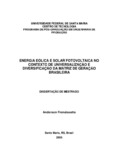| dc.creator | Franciscatto, Anderson | |
| dc.date.accessioned | 2007-11-09 | |
| dc.date.available | 2007-11-09 | |
| dc.date.issued | 2005-03-11 | |
| dc.identifier.citation | FRANCISCATTO, Anderson. Wind power and solar photovoltaic energy in the context of universalization and diversification of the generation matrix brazilian. 2005. 113 f. Dissertação (Mestrado em Engenharia de Produção) - Universidade Federal de Santa Maria, Santa Maria, 2005. | por |
| dc.identifier.uri | http://repositorio.ufsm.br/handle/1/8431 | |
| dc.description.abstract | This work presents an investigation of the most suitable scenarios for the generation of electrical energy from wind power and photovoltaic sources, focusing the changes that occur in the Brazilian electrical sector in the current scenario of economic and social development. The work was developed in a structure oriented to quality and productivity and instigates the use of these sources as a contribution to
the supply of electrical energy, as well as the opportunity of the diversification to contribute to the sustainability and universal access by the whole population. As a means of information, the following elements were investigated: the increase of supply and demand of electrical energy compared to GNP (Gross National Product), the external dependance of electrical energy, the make-up of the matrix of electrical
energy generation, universalization indices, human development indices and the quality of the supplied electrical energy. The results of this work show the following
aspects: there is a relation between the GNP increase and the supply and demand of electrical energy; the production of electrical energy by the approached renewable sources has specific scenarios, with specific regulamentation and particular
conditions of application; the indices of universalization can be easily reached making use of these sources; the wind power is a strategic investment for the country; the areas with the lowest human development index also suffer from the
worst quality of supplied energy; low human development indices also have a relation with the no access to electrical energy; the regions with less development will be the
last ones to be assisted by the universalization project 2004-2015. | eng |
| dc.format | application/pdf | por |
| dc.language | por | por |
| dc.publisher | Universidade Federal de Santa Maria | por |
| dc.rights | Acesso Aberto | por |
| dc.subject | Energia eólica | por |
| dc.subject | Fotovoltaica | por |
| dc.subject | PIB | por |
| dc.subject | Universalização | por |
| dc.subject | Sustentabilidade | por |
| dc.subject | Wind power | eng |
| dc.subject | Photovoltaic | eng |
| dc.subject | GNP | eng |
| dc.subject | Universalization | eng |
| dc.subject | Sustainability | eng |
| dc.title | Energia eólica e solar fotovoltaica no contexto de universalização e diversificação da matriz de geração brasileira | por |
| dc.title.alternative | Wind power and solar photovoltaic energy in the context of universalization and diversification of the generation matrix brazilian | eng |
| dc.type | Dissertação | por |
| dc.description.resumo | Este trabalho apresenta uma investigação dos cenários mais propícios para geração de energia elétrica a partir das fontes eólica e solar fotovoltaica, enfocando as mudanças ocorridas no setor elétrico brasileiro no atual cenário de desenvolvimento econômico e social. O trabalho foi desenvolvido numa estrutura orientada à qualidade e produtividade e instiga o uso dessas fontes como contribuição ao suprimento de energia elétrica, oportunidade de diversificação para contribuição à sustentabilidade e universalização ao acesso por toda a população.
Como meio de informação, foram investigados o crescimento na oferta e consumo de energia elétrica em comparação com o Produto Interno Bruto (PIB), dependência externa de energia elétrica, composição da matriz de geração de energia elétrica, índices de universalização, índices de desenvolvimento humano (IDH) e qualidade da energia elétrica fornecida. Os resultados deste trabalho apontam que: existe
relação entre o crescimento do PIB e o consumo e oferta de energia elétrica; a produção de energia elétrica pelas fontes renováveis abordadas tem cenários pontuais, com regulamentação específica e condições particulares de aplicação; os índices de universalização podem ser mais facilmente alcançados fazendo-se o uso dessas fontes; a energia eólica é um investimento estratégico para o país; as áreas com menor IDH também são as atingidas pelo não-acesso e pior qualidade de energia fornecida; baixos IDHs também tem relação com o não acesso a energia elétrica; as regiões com menor desenvolvimento serão as últimas a serem atendidas pelo projeto de universalização 2004-2015. | por |
| dc.contributor.advisor1 | Hoffmann, Ronaldo | |
| dc.contributor.advisor1Lattes | http://lattes.cnpq.br/4625067103734943 | por |
| dc.contributor.referee1 | Farret, Felix Alberto | |
| dc.contributor.referee1Lattes | http://lattes.cnpq.br/5783619992936443 | por |
| dc.creator.Lattes | http://lattes.cnpq.br/2141255438325700 | por |
| dc.publisher.country | BR | por |
| dc.publisher.department | Engenharia de Produção | por |
| dc.publisher.initials | UFSM | por |
| dc.publisher.program | Programa de Pós-Graduação em Engenharia de Produção | por |
| dc.subject.cnpq | CNPQ::ENGENHARIAS::ENGENHARIA DE PRODUCAO | por |


